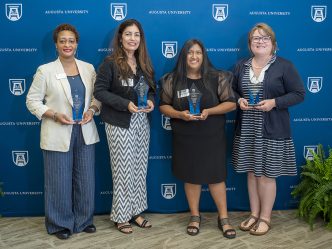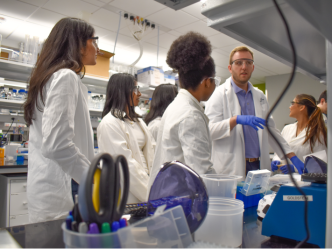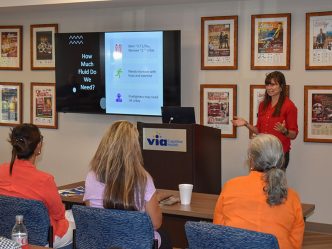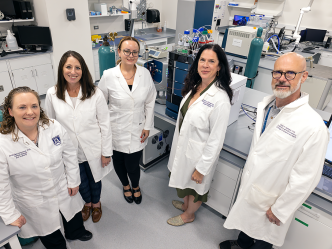Dr. He Yang, assistant professor of mathematics, has received a grant from the Center for Undergraduate Research in Mathematics, which is funded by the National Science Foundation. With this grant, Yang will engage five undergraduate students at Augusta University in conducting a year-long research project in applied and computational mathematics. Each student participant will receive a stipend in fall 2022 and spring 2023.
CURM grant awards provide funding for undergraduate research groups throughout the United States. Yang’s research grant will help students develop enthusiasm for the mathematical and computational sciences and gain valuable mentorship to support them throughout the process. They will develop essential research skills to prepare them for success in graduate school and their careers.
About Yang
After completing a PhD in mathematics at Rensselaer Polytechnic Institute in 2014, Yang became a postdoctoral research fellow in the Department of Radiology at Stanford University for a year. He then earned a Hans J. Zassenhaus Visiting Assistant Professorship in the Department of Mathematics at The Ohio State University, where he worked for two years, before joining Augusta University in 2017.
A dedicated researcher, Yang has published 25 research papers covering various topics in numerical analysis, scientific computing and medical imaging. In several of his research projects, he has engaged undergraduate students. He mentored an undergraduate student in research projects investigating deep learning. These projects were funded by a STEM undergraduate scholarship grant awarded as the result of a research partnership between Augusta University and the Savannah River National Laboratory.
As a faculty mentor in the Center for Undergraduate Research and Scholarship’s Summer Scholars Program, he also engaged three students for research projects in machine learning methods in biology, as well as an inverse problem for a brain tumor model.
In addition, he has supervised several undergraduate students in research projects involving partial differential equation-based image processing, numerical approximation of blow-up time for the nonlinear heat equation and an inverse problem of the diffusion coefficient reconstruction in a fractional diffusion model.
Though early in his career at Augusta University, Yang has already been recognized for his accomplishments by his colleagues. In 2020, he received the College of Science and Mathematics Outstanding Young Faculty Award. In 2021 he was honored as the recipient of the Excellence in Research Award.
About Yang’s research
Yang’s research, titled “Analytical and numerical methods for the saturation equation and related inverse problem,” arises from the modeling of a two-phase immiscible flow through a porous medium.
“In other words, we consider a model that describes a flow in which two different substances are simultaneously present, and these two substances do not mix to give a single phase, such as oil and water, or a mudflow,” Yang explained. “In addition, the flow moves in a material that contains sufficient open space for the flow to pass through. There are a great number of applications of the two-phase immiscible flow through a porous medium in the real world.”
Yang’s research is important for the oil industry; for example, many oil companies inject carbon dioxide into an oil reservoir to push the oil to a production wellbore to extract more oil. The research project aims to develop both analytical and numerical methods to solve the model.
“I hope our research will provide a guideline on how to choose an efficient algorithm to obtain the solution for different situations, as well as how to estimate the parameters of the model using an additional measurement,” he said.
Dr. Seth Oppenheimer, professor and chair of mathematics, applaud Yang’s excellence as a researcher and teacher. He praises that Yang has gone above and beyond by mentoring several undergraduate students in research.
“Augusta University is fortunate to have such a high-caliber researcher as Dr. Yang, who is also passionately dedicated to opening the world of research for our students,” Oppenheimer said.
Students needed for mathematical research
“This add-on NSF grant will assist Dr. Yang in supporting more students to engage in undergraduate research. This is a fantastic opportunity for our students,” Oppenheimer said. “Undergraduate research allows students to both go deeper into mathematics and serves as a way to integrate knowledge from different mathematics courses that may not seem related.”
Yang is looking for five motivated students to join his research group. The research group will collaborate with Dr. Koffi Fadimba, professor of mathematical sciences from the University of South Carolina at Aiken.
To qualify for this research position, the undergraduate student applicant must have completed Calculus I and II and have a strong desire to learn.
Students in his research group are expected to work at least 10 hours per week during the award period, September 2022 to May 2023. They are also expected to present the research at a regional mathematics meeting and submit the final research report.
Each student will get a $3,000 stipend, which would lower the students’ financial stress and provide an excellent opportunity to focus on mathematics study and research. The students will be trained in computer programming, scientific writing, presentation skills and analytical and numerical methods for physics models.
Any qualified student interested in a research position should contact Dr. He Yang directly to apply.
 Augusta University
Augusta University




